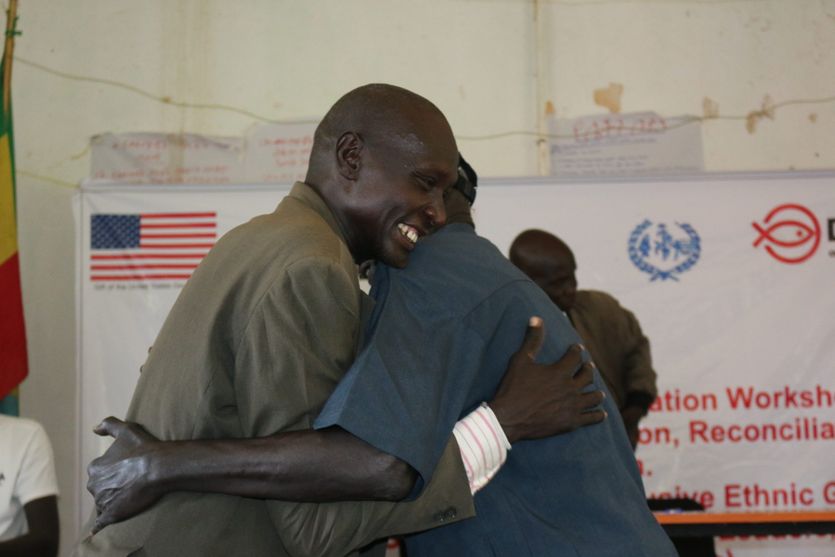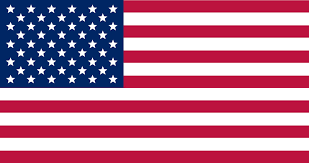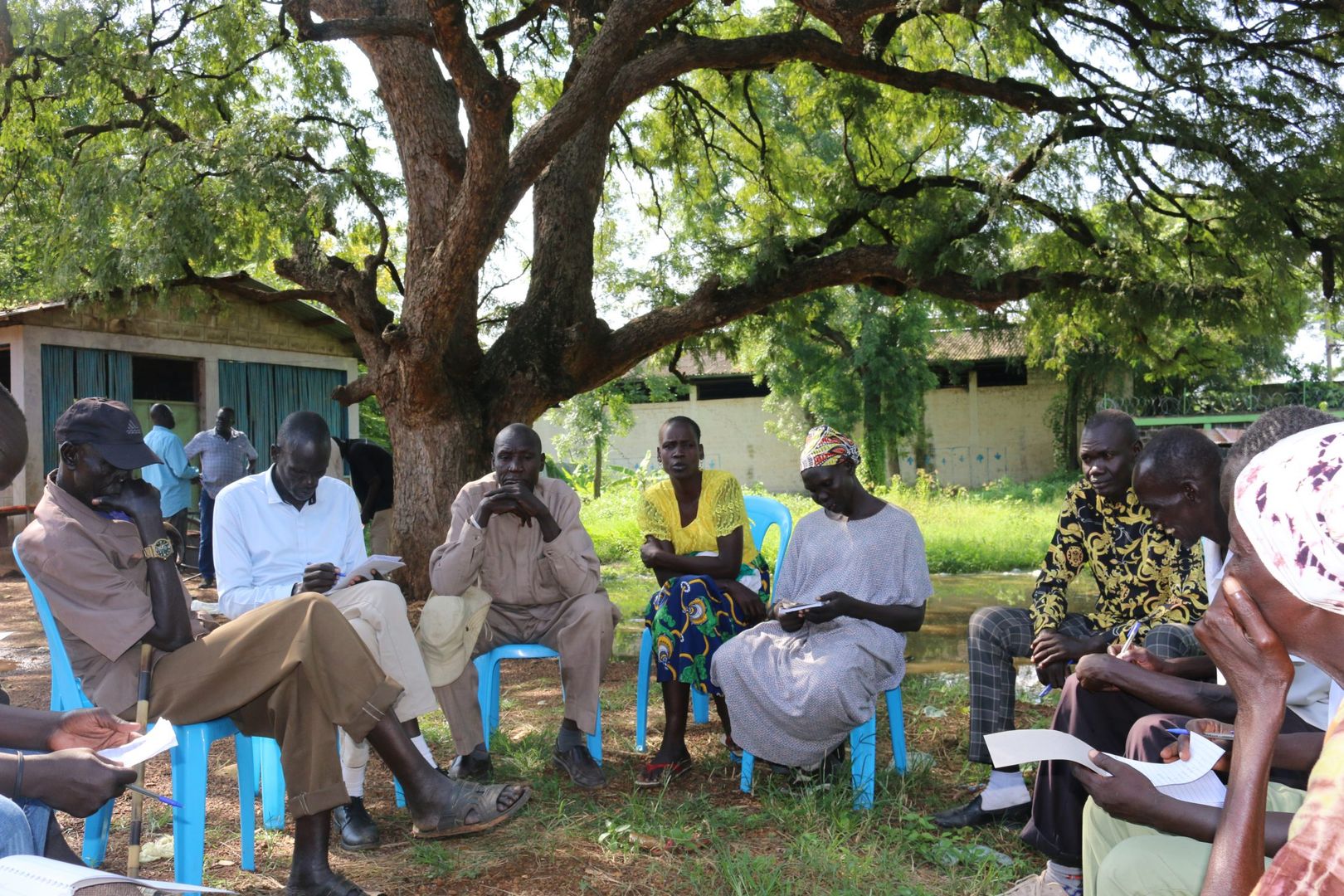In the Itang special woreda of Gambella Region, DCA organized a peace conference from 4-8 September 2023, to promote peace and reconciliation among the refugees and host communities. The event aimed to raise awareness on the current security situation in the region and foster dialogue between participants belonging to different groups. By bringing together religious leaders, respected elders, scholars, refugee and host community representatives, youth, and women, DCA created a platform for open discussions and collaboration.
The conference was composed of two main events: a community dialogue and Scholar’s Forum. It was delivered through several mediums such as awareness training, panel discussions, storytelling, Group work and presentations.
Building Peace and Trust through Community Dialogues
In this gathering, elders, religious leaders, women and youth groups as well as refugee and host community representatives came together. They belonged to different backgrounds, religions, and ethnicities, all residing in the Itang Special Woreda.
“Our coexistence does not depend on being similar; instead, it thrives when we embrace and tolerate our differences. Rather than seeking uniformity, we can find peace by recognizing that our diverse qualities and perspectives complement each other.”Tut Riki, a South Sudanese refugee and a participant of the forum.
During the dialogue, participants discussed matters of common concern, such as ways to strengthen culturally relevant approaches to dispute resolution, to both refugee and host communities. The sessions aimed to encourage participants to resolve issues and disputes through inclusive discussions. By engaging in inter-faith and inter-ethnic dialogues, trust can be built between various groups.

DCA’s approaches to Peacebuilding
DCA recognizes the significance of nurturing peaceful and inclusive societies. That’s why we actively engage in initiatives that address the root causes of conflicts, promote dialogue, and build trust among individuals and communities. Our participatory and community-centered approach empowers local communities, facilitates constructive dialogue, and fosters sustainable solutions, ultimately contributing to lasting peace and social cohesion.
DCA utilizes various approaches to prevent conflicts and promote peace. These include:
- Inclusive Dialogue: We organize and facilitate dialogue processes that bring together diverse community members, such as elders, religious leaders, youth, and women. By creating a safe space for discussions, we encourage cooperation and understanding among different groups.
- Engaging Women and Youth: We actively involve women and youth in peacebuilding efforts. Recognizing their unique perspectives and abilities, we empower them to play an active role in resolving conflicts and promoting peace within their communities.
- Capacity Building: DCA enhances the skills and knowledge of local actors in peacebuilding, conflict prevention, management, mediation, and dialogue facilitation. By strengthening their intervention role, we promote their ability to contribute effectively to peacebuilding initiatives.
- Trauma Healing: We acknowledge the impact of trauma on individuals and communities affected by conflicts. Through trauma healing programs, we provide support and counselling to help individuals recover, fostering healing and reconciliation within communities.
- Collaboration with Leaders: DCA collaborates with religious and customary leaders, as well as elders, who hold influential positions in their communities. By working together, we tap into their leadership and authority to promote peace, resolve conflicts, and build social cohesion.
- Networking and Partnership: We actively engage in networking and partnership initiatives to learn from others’ experiences and share best practices. By collaborating with like-minded organizations, we maximize our impact and create a broader platform for peacebuilding efforts.
- Local Peace Structures: DCA helps establish local-level peace structures, such as peace or protection committees. These structures serve as platforms for community members to address conflicts, foster dialogue, and promote peaceful coexistence.
- Collaboration with Schools: We work with schools to promote peace through activities such as peace clubs, sports events, and cultural exchanges. By involving young people in peacebuilding from an early age, we cultivate a culture of peace among future generations.
Nyakoach Reat, a refugee participant of the dialogue shed light on the profound effects of conflict on women. She emphasized that women, in particular, experience heightened vulnerability during times of conflict. The simple act of venturing far to gather firewood or fetch water exposes them to various risks. “As a result, we bear a unique responsibility to actively contribute to the pursuit of peace,” said Nyakoach.
It was noted that women often shoulder additional responsibilities in conflict-affected areas. They become primary caregivers for children, the elderly, and the injured, assuming roles that demand immense strength and resilience. They strive to protect and provide for their families amidst challenging circumstances, often with limited resources and support systems. As a result, it is imperative to involve women in decision-making platforms and ensure their proactive participation in the process of peace building.
Religious leaders, who were also active participants in the dialogue, shared their profound insights and perspectives. They emphasized the fundamental principles of their respective faiths that promote peace, compassion, and understanding among all individuals. These leaders highlighted the importance of transcending religious and ethnic differences to foster unity and coexistence within the community. They emphasized that by embracing the values of love, forgiveness, and tolerance, individuals can bridge divides and work towards a harmonious society.
“Within each of us pulses red blood, a universal reminder of our common humanity. Yet, it is our collective yearning for peace that truly unites us in a profound way.” said Obang Ogud, a prominent figure within the host community and member of the peace committee. Obang’s commitment to peacebuilding extends beyond mere words. He actively engages in mediation efforts, seeking to bridge divides and facilitate understanding among conflicting parties. His dedication and effectiveness in this role have earned him recognition and accolades at the regional level, a testament to his significant contributions to fostering peaceful coexistence.
The community dialogue was conducted in collaboration with the Gambella regional and Itang District Peace and Security Offices. The sessions were facilitated by DCA-ET Peace Building and Social Cohesion Program Advisor and experts from the regional peace and security office. Operational Partners such as Refugees and Returnees Service (RRS), and United Nations High Commissioner for Refugees (UNHCR) were also present, and requested for better mutual cooperations, integration and problem-solving for sustainable peace.
Nurturing Peace Through Community Influencers: Scholars’ Forum
The other part of the conference was a three-day forum that particularly targeted scholars and opinion leaders who have greater influence among their respective communities. The objective was to navigate ways on how scholars could become peace agents, using their influences.
Through discussions and the magic of shared experiences, the forum delved into the tapestry of local knowledge and conflict resolution skills. Together, they examined the impact of conflicts and explored early response mechanisms including identifying potential conflict triggers, engaging in mediation to find mutually acceptable solutions and mobilising the community towards peace building.
Realizing the power they hold in promoting peace and social cohesion, they discovered that their voices could be the catalysts for change, inspiring others to engage in building a future united by understanding and tolerance. They also pointed out the need for such platforms on a regular basis to foster inclusive dialogues.
DCA highlighted its commitment towards promoting social cohesion through the active participation of grassroot communities with due respect for human rights, creation of inclusive society, unity based on equality and sustainable peace in Gambella region and in Ethiopia at large.

The conference was concluded by the Establishment of Itang Special Woreda Peace committee. Participants have nominated and voted for their representatives in the committee whose purpose is to work on strengthening a culture of peace, conflict management and resolution which will build the social cohesion among the communities. The committee will promote dialogues, mobilise their communities for inter-community conversations, and serve as a bridge between the community to exchange views on issues of conflict and peace building.
“The knowledge and insights we acquire here [at the peace forum] must not remain confined within ourselves but should be shared with our neighbours and communities. By passing on what we have learned, we empower others to join us in building a more peaceful place, where our collective voices resonate as catalysts for positive change.”Biey Ochar, a resident of the Itang town and Host Community Representative

About the Project
The peace conference was part of the Food and Livelihood Improvement Project that is funded by US State Department’s Bureau of Population, Refugees and Migration (BPRM).


